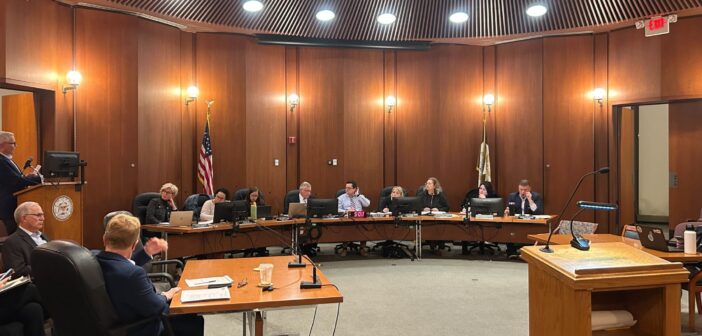The Bethlehem City Council convened on Nov. 19 to discuss letters sent to Bethlehem residents about lead water pipes and a study on accessory dwelling units.
Water Issues
Edward Boscola, director of the Department of Water and Sewer Resources in Bethlehem, informed the council members about a roadmap for removing lead pipes in the City of Bethlehem.
Recently, the Environmental Protection Agency approved the Lead and Copper Rule Improvements regulation on Oct. 8. The City of Bethlehem then sent letters to the 37,000 residents who use the Department of Water and Sewer Resources, notifying them about their water service line status and the presence of lead pipes in the city.
Boscola said while the main lines are not made of lead, some pipes that connect directly to houses are made of lead.
He said lead pipes in Bethlehem were mostly installed in 1920-1940 and stopped being used in 1991 after the original Lead and Copper Rule was passed. Any houses built after 1991 in Bethlehem do not contain lead pipes.
However, houses built before then must be tested to see if their pipes are made of lead, Boscola said. The Department of Water and Sewer Resources plans to know the material of the water pipes in every customer residence in Bethlehem by 2027.
“We have records of addresses, dates, line sizes and who installed them — dating back to 1910,” Boscola said. “What we don’t have is the material.”
Boscola said Bethlehem’s water line records exist, but they lack information on the materials used. He said the gap in data is driving the research process.
By 2037, the department plans to update all water lines that are made of lead.
Councilwoman Colleen S. Laird acknowledged the unsettling nature of the letters residents sent to residents including herself, but said she’s glad the issues are now being addressed.
Currently, the cost to replace lead pipes is estimated at around $10,000 per residence. It’s uncertain whether the city will cover the full expense. However, the city is being encouraged by “regulators” to be responsible for the financial burden to relieve residents.
Bethlehem residents who suspect they have lead pipes can send an email to Email [email protected] to request a free water test. The test is only available to homeowners who believe their pipes may contain lead, not to those who are certain their pipes are lead-free. Due to limited resources, testing cannot be offered to all residents.
The current federal EPA action level for lead in water is over 15 parts per billion, while Bethlehem’s water consistently measures under 1 part per billion. While efforts are underway to remove lead pipes, the water remains safe to drink. This data, sourced from water tested within Bethlehem homes, reflects the quality of water for residents as a whole.
“It is really reassuring to hear that our levels coming out of the faucet are so far below any danger,” Laird said. “Bethlehem has had a reputation for quality water for a very long time and I think we can continue to say that that is true.”
Accessory Dwelling Unit Study
The council also discussed the potential integration of Accessory Dwelling Units (ADUs) into Bethlehem’s zoning codes. The council voted 5-2 in favor of approving a $65,000 conduct study on the impact of ADUs on local zoning
The study will be conducted in collaboration with Lehigh University to research and assess the City of Bethlehem’s capacity for ADUs, Collins said.
An accessory dwelling unit is a secondary residential unit on the same lot as a primary dwelling unit. For example, a garage converted into a living space would be considered an accessory dwelling unit.
She said the city and Lehigh plan to work with Woodsong Associates, a third-party consultant firm based in Portland, Oregon.
Laura Collins, director of the Bethlehem Community and Economic Development department, said the study is valuable as it’s shedding light on the potential impacts of ADUs in East Coast communities. She said while most similar studies have focused on the West Coast, this research will offer insight into how ADUs may affect the communities on the East Coast.
“ADUs are a very popular topic of conversation right now nationwide when we’re talking about affordable housing,” Collins said. “In California and the West Coast, they gained popularity early, but now a lot of communities like ours are looking at ADUs as an option.”






Comment policy
Comments posted to The Brown and White website are reviewed by a moderator before being approved. Incendiary speech or harassing language, including comments targeted at individuals, may be deemed unacceptable and not published. Spam and other soliciting will also be declined.
The Brown and White also reserves the right to not publish entirely anonymous comments.
1 Comment
More money wasted on consultants with this administration. At least we have 2 council members that have common sense to vote against another boondoggle study.